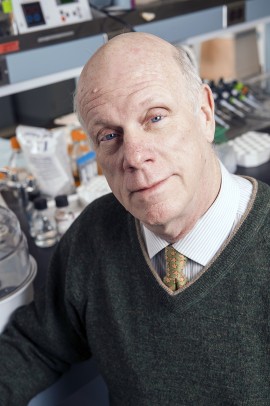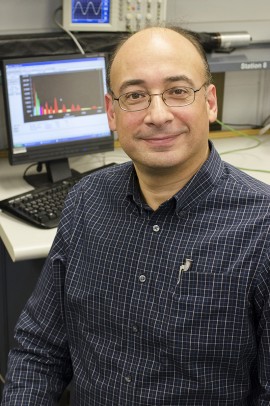Neurobiologist, physicist lauded for scientific contributions
A neurobiologist and a physicist are the latest UIC researchers named fellows of the American Association for the Advancement of Science, the world’s largest general scientific society and publisher of the highly regarded peer-reviewed journal Science.
Scott Brady, professor and head of anatomy and cell biology in the College of Medicine, was cited for his contributions to the study of cell and molecular biology of neurons.
Nikos Varelas, professor of physics in the College of Liberal Arts and Sciences, was honored for his work in experimental particle physics.
They will be among 388 AAAS fellows honored Saturday at the association’s annual meeting in Chicago.
Brady’s work has led to the discovery of cellular mechanisms associated with neurological disorders that affect millions worldwide, and may help in the development of new treatments.
He studied how nutrients, proteins and signaling molecules, including neurotransmitters, get from one end of a neuron — some can reach three feet in length in humans — to the other. He helped develop a technique combining video and electron microscopy for directly observing, in real time, the transport of materials along the nerve axon in squid neurons.
His recent research suggests that holdups in the transport of materials along the nerve axon may play an important role in the development of neurodegenerative disorders.
Brady and his colleagues found that a mutant protein associated with inherited ALS caused slowdowns in the transport and delivery of cellular materials when added to squid neurons.
These slowdowns could cause one end of the cell to run out of materials it needs and lose its synaptic connectivity with neighboring neurons. Without these connections, neurons die.
Brady believes that this process may underlie the gradually worsening symptoms associated with adult onset neurodegenerative diseases such as ALS, Alzheimer’s and Huntington’s disease.
Brady received a B.S. from Massachusetts Institute of Technology and a Ph.D. in cellular and molecular biology from the University of Southern California, followed by a post-doctoral fellowship at Case Western Reserve University. He was a faculty member at the University of Texas Southwestern Medical Center before joining UIC in 2002.
Varelas’ research in high-energy particle physics focuses on the building blocks of matter and the forces that bind them together.
Over the last two decades — as part of the D-Zero experiment at Fermilab and the Compact Muon Solenoid experiment at the Large Hadron Collider at CERN — he has investigated the strong interaction that binds quarks together into protons and neutrons.
The Compact Muon Solenoid experiment includes over 3,500 scientists, organized into groups, attacking different aspects of the experiment from building the detector to processing and analyzing the enormous amount of data.
He was also involved in the search for the Higgs boson new subatomic particles. With his team at UIC, he established that quarks behave like fundamental entities down to the level of one thousandth of a trillionth the size of a human hair.
Varelas received his B.Sc. from the University of Athens and a Ph.D. in physics from the University of Rochester. After three years as a postdoctoral research associate at Michigan State University, he joined the UIC physics faculty in 1997. He has also been a guest scientist at Fermilab.
A 2013 University Scholar, he received the College of Liberal Arts and Sciences Outstanding Faculty and Faculty Service Award in 2012.


